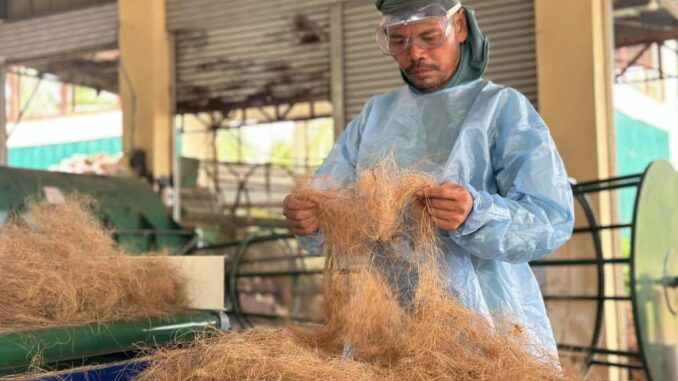
PROCESSING coconut husks into coir or geonet is a profitable venture, according to the Philippine Center for Postharvest Development and Mechanization (PHilMech).
The agency recently awarded to a coconut-based farmers’ group in Placer, Surigao del Norte, first completed shared processing facility (SPF) the SPF component of the Coconut Farmers and Industry Development Plan (CFIDP).
“And with geonet and coco peat having a big demand, PHilMech pegged the internal rate of return for the facility at 171.74 percent. Hence, the project is expected to generate a return of P10.30 for every peso investment made with a payback period of 0.61 year or less than a year,” PHilMech said.
A worker inspects coco coir produced by a processing facility awarded to a farmers’ group in Surigao del Norte by the Philippine Center for Postharvest Development and Mechanization. PHOTO FROM PHILMECH
“In this case, the relatively short payback period suggests the project can generate sufficient cash flows to cover its initial investment within a reasonable time frame,” it added.
Turned over to the Mabini United Farmers Cooperative is a facility worth P5.17 million, established on land owned by the group that has 127 members who are all coconut farmers.
PHilMech Director Dionisio Alvindia said the turnover of the facility is a milestone for both the agency and members of the Mabini United Farmers, as the SPF is the very first in the Philippines to be completed under the CFIDP.
“Today or September 11 is a historic day for both PHilMech and the Mabini United Farmers Cooperative, as the coconut farmers in this town of Placer in Surigao del Norte are the recipient of the very first SPF to be completed by the agency under the CFIDP,” he said.
“Through the P5.17-million facility, the Department of Agriculture, the Philippine Coconut Authority, and we at PHilMech are contributing to the continued fight of the people of Surigao del Norte against poverty,” he said.
Alvindia said that once production commences, the facility will also reduce the volume of coconut husks that are mostly discarded as farm waste.
The facility will require 5,000 coconut husks per production run, each purchased at P0.50 from coconut farmers, as input. Coconut husks are usually thrown away as waste or used to produce charcoal.


Be the first to comment